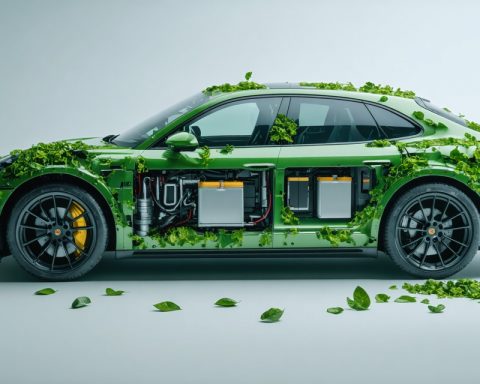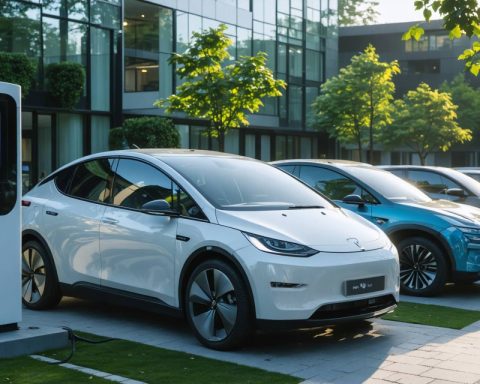- Porsche is pioneering sustainability with a new pilot project focused on recycling high-voltage EV batteries.
- Through mechanical shredding, discarded batteries are transformed into “black mass,” containing valuable elements like nickel, cobalt, manganese, and lithium.
- The refined materials meet Porsche’s stringent quality standards, enabling integration into new battery cells and future models.
- This approach supports a circular economy by reclaiming critical raw materials, reducing environmental impact, and securing future supply chains.
- The project anticipates EU battery regulations, reinforcing Porsche’s commitment to eco-friendly production and its reputation as a sustainable innovation leader.
Porsche has taken a bold leap into the future of sustainability with an innovative pilot project focused on recycling high-voltage electric vehicle (EV) batteries. This pioneering effort seeks to reclaim critical raw materials and cement Porsche’s role as a visionary in green technology.
Imagine the intricate guts of an EV battery, once thought to be waste, dismantled and transformed into something precious. Through a meticulous process of mechanical shredding, these discarded devices are turned into what’s called “black mass.” This raw, granular substance holds within its dark depths essential elements like nickel, cobalt, manganese, and lithium—materials increasingly scarce and valuable. Already, Porsche has successfully created around 65 tonnes of this precious granulate, harvested from batteries of development vehicles.
The journey doesn’t end with shredding. Porsche breathes new life into these materials by refining the “black mass” to extract high-purity elements. These elements are then subjected to rigorous refinement, ensuring they meet the company’s stringent quality benchmarks. Such precision not only honors the performance standards that Porsche is famous for but also ensures a seamless integration into new battery cells.
In a forward-thinking climate, where material consistency and cleanliness are critical, this closed-loop system emerges as a beacon of progressive industrial practice. As these recycled elements find their way into innovative new cells, they promise to fuel future models, which Porsche plans to rigorously test in real-world scenarios.
This ambitious pilot project illustrates more than just an engineering feat; it is emblematic of Porsche’s deeper ambitions. The circular economy stands as a central pillar of Porsche’s sustainability strategy, reflecting a proactive approach to the foreseeable challenges of raw material scarcity. By embracing this model, Porsche not only reduces environmental impact but also strategically secures its future supply chain against geopolitical uncertainties.
Projected into the coming decade, Porsche is aligning itself with anticipated EU battery regulations set for 2031, which will necessitate higher recycled content and greater traceability. By being ahead of the curve, Porsche solidifies its commitment to eco-conscious resource use, reinforcing its reputation as a trailblazer in sustainable vehicle production.
As Porsche paves the way for a greener tomorrow, it eloquently demonstrates that with vision, what was once discarded as waste can indeed become the forerunner of industry gold. Their relentless pursuit of innovation and responsibility sets a dazzling precedent for the automotive world, heralding a future where sustainability seamlessly intertwines with luxury and performance.
Porsche’s Revolutionary Leap in EV Battery Recycling
Introduction
Porsche’s innovative pilot project in high-voltage electric vehicle (EV) battery recycling marks a significant breakthrough in green technology. By focusing on reclaiming critical raw materials like nickel, cobalt, manganese, and lithium from used EV batteries, Porsche is pioneering a sustainable path forward while aligning with future EU regulations. This initiative underscores Porsche’s commitment to a circular economy and sets a high standard for sustainable luxury vehicles.
Key Aspects of Porsche’s Recycling Initiative
How the Process Works
1. Mechanical Shredding: Discarded EV batteries are meticulously dismantled and mechanically shredded into “black mass,” a raw substance containing critical materials.
2. Refinement and Purification: The black mass undergoes a rigorous purification process to extract high-purity elements, aligning them with Porsche’s stringent quality benchmarks.
3. Reuse in New Batteries: Purified elements are reintegrated into new battery cells to be tested in future Porsche models, showcasing a closed-loop recycling system.
Real-World Use Cases and Implications
– Sustainability and Performance: This initiative not only reduces environmental impact but also maintains Porsche’s standard of high performance by ensuring that the recycled elements meet exacting standards.
– Supply Chain Security: By reclaiming these scarce materials, Porsche enhances the resilience of its supply chain against geopolitical risks and potential scarcities of raw materials.
Industry Trends and Market Forecasts
– Rising Demand for EVs: With the global shift towards electric vehicles, the demand for batteries and associated raw materials is set to increase exponentially. Porsche’s recycling project is timely, positioning the company as a proactive leader in the sustainable sourcing of these critical components.
– Regulatory Alignment: Aligning with anticipated EU regulations for 2031, Porsche is setting a benchmark for other automakers, prioritizing recycled content and traceability.
Controversies and Limitations
– Technical Challenges: While the project is promising, the technical challenge of refining materials from black mass to the required purity and consistency levels remains a barrier for large-scale adoption.
– Economic Viability: The cost-effectiveness of the recycling process compared to traditional raw material extraction methods is crucial for future scalability.
Insights and Recommendations
– Industry Collaboration: Automakers should collaborate with technology providers to improve recycling techniques and share best practices to enhance the economic viability of battery recycling.
– Consumer Engagement: Educating consumers about the benefits of recycled batteries could enhance brand loyalty and highlight Porsche’s commitment to sustainability.
– Innovation and Research: Continued investment in R&D is essential for advancing recycling technologies and processes, ensuring the long-term sustainability of the automotive industry.
Conclusion
Porsche’s bold step into EV battery recycling illustrates a profound shift toward sustainable automotive practices. This project reinforces Porsche’s legacy as an innovator in luxury performance while charting a sustainable future. By aligning with future regulations and championing a circular economy, Porsche is not just recycling batteries but redefining the luxury automotive industry.
For more information on Porsche’s initiatives and innovations, visit Porsche.
Quick Tips
– Adopt Strategic Recycling: Companies can reduce costs and environmental impact by implementing strategic recycling initiatives.
– Stay Informed on Regulations: Businesses should keep abreast of regulatory changes to ensure compliance and maintain a competitive edge.
– Embrace Innovation: Leveraging cutting-edge technologies can lead to sustainable practices and long-term business success.

















